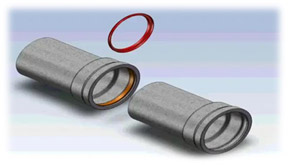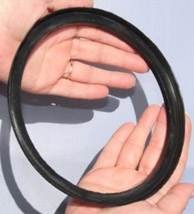Pipe Repair On A Budget
A new pipe-repair solution promises to save time and money, while also being sustainable, long-lasting, fully scalable, and safe for workers.
Pipes are vital to connect the water (and wastewater) sources to consumers and businesses efficiently, economically and reliably. As with many everyday resources, these are simply assumed as functional means that just happen for us. Yet, as with all assumed everyday resources, breakage occurs, lives are disrupted, businesses are affected and injuries during the repair processes occur.
To understand the problem, there are an estimated 240,000 water main breaks per year in the United States (source: American Society of Civil Engineers). Assuming every pipe would need to be replaced, the cost over the coming decades could reach more than $1 trillion, according to the American Water Works Association. This issue is further impacted with: 1) money and time spent on repairs, 2) corrosion damage, and 3) injured workers (current repair process, via a cut-off saw, is OSHA-prohibited; source: https://www.osha.gov/ 1926.303(d)/Interpretation).
Moreover, U.S. potable water and wastewater infrastructure are in disrepair and failing and both scored a “D” in the American Society of Civil Engineers’ (ASCE) 2013 annual report, “Report Card for America's Infrastructure.” Corrosion is possibly the greatest single contributing factor to the increasing number of system leaks and failures by these infrastructure markets.
The Key Pain Points
Just with repairs alone, each day, 657 water main breaks occur in North America at a total annual repair cost of over $3 billion.
The magnitude of the problem is further evidenced as follows:
- The EPA estimate for corrosion cost on US water lines is ~$4.4-$5.0 billion per year and growing.
- The EPA’s 2011 drinking water infrastructure needs survey cited the need in aggregate for the municipal sector to invest about $384 billion in the upcoming 20 years to maintain existing infrastructure quality.
Let’s take this one step further:
1. Costs and Time – Pipe joining methods are expensive requiring extensive labor, equipment and installation time. The average crew time for current ranges from 7-150 minutes depending on bevel diameter.
2. Safety – As noted, industry standard installation and repair procedures for joining pipelines are unsafe and OSHA prohibited.
3. Corrosion –The EPA estimates 4,000-5,000 miles of annual drinking water pipe replacements each year and, this is projected to peak in 2035 at 16,000 to 20,000 miles each year.
Repair Practices To Date
There are currently three methods for providing corrosion control for ductile iron piping systems: 1) polyethylene encasement sleeve (poly wrap); 2) adding complex and expensive cathodic protection devises; 3) doing nothing and incurring the increased costs and the effects of corrosion. Of these three, doing nothing has been the most common method employed until such time that a pipe breaks. Poly wrap is the recommended solution for mitigating corrosion, but it has a reputation for poor performance due to rips and tears that can occur during installation. The other methods address corrosion but elevate safety hazards and are far more expensive, time consuming and less reliable solutions.
 A New Solution
A New Solution
Infra-Tect is focused on developing and selling products that deliver a lower cost of installation, operations, maintenance and repair for water and wastewater infrastructure piping systems. We have designed and patented ground-breaking product innovations for utility systems. The Bevel-Sert, our initial product, is patented and proven to improve ductile iron pipe water infrastructure (DIP) by greatly reducing the time and money spent on new installation and repairs, improving installation safety and reducing corrosion.
In fact, the Bevel-Sert is easy to install (~1-minute to install), saves ~50%-89% in installation costs, eliminates the OSHA-prohibited beveling practice and significantly reduces the pipe’s ability to conduct electricity, which reduces the corrosion process by up to 99%.
 Made from HDPE, the Bevel-Sert is suitable for use in potable water applications where the outside diameter of the pipe is the same as ductile iron pipe. The size range is 4" to 48" in diameter. The HDPE bevel is smooth-finished to allow for use with all types of rubber gaskets, including restrained-joint rubber gaskets. The rounded bevel compensates for differing angles of deflection which can frequently occur during installation.
Made from HDPE, the Bevel-Sert is suitable for use in potable water applications where the outside diameter of the pipe is the same as ductile iron pipe. The size range is 4" to 48" in diameter. The HDPE bevel is smooth-finished to allow for use with all types of rubber gaskets, including restrained-joint rubber gaskets. The rounded bevel compensates for differing angles of deflection which can frequently occur during installation.
Considering the high benefit to cost ratio for utilizing the Bevel-Sert, the product can easily be used in situations where the industry is currently doing nothing. Furthermore, in those areas where the corrosion potential is severe, the Bevel-Sert can be used in conjunction with poly wrap to add an extra level of protection for the piping system at little or no additional cost. Likewise, the Bevel-Sert product can by employed in conjunction with cathodic protection to enhance corrosion mitigation properties and eliminate the need to bond pipe joints together.
In effect, Bevel-Sert is: 1) cheaper, faster, easier, safer and reliable; 2) sustainable, long-lasting; 3) scalable to meet anticipated demands; 4) the solution that address the three well-documented pain points; 5) well-thought of by key customer groups and; 6) patent-protected.
Who Would Benefit From The Bevel-Sert?
Municipalities, private water companies, pipe manufacturers, wholesale distributors of ductile iron pipe and engineers who specify water infrastructure solutions are actively seeking a solution for their corrosion issues, which Infra-Tect provides. Product distributors see the value of working with piping contractors to utilize the Bevel-Sert product when they purchase ductile iron pipe and fittings. Municipalities who buy ductile iron piping and the engineers who develop the specifications for these users have also recognized its value.
A Good Solution For A Significant Problem
The Bevel-Sert is a simple yet significant and positively disruptive solution to major and very evident pain points. It will improve everyday water-related issues that are taken for granted, save on time and costs, including medical and insurance costs associated with the current OSHA-prohibited repair practices and reduce the cause associated with water main breaks, i.e., corrosion.
For more information, please contact Mike Neill, CEO/President at 480-643-9161 or at mneill@infra-tect.com. Or, visit the Infra-Tect website at www.infra-tect.com.
